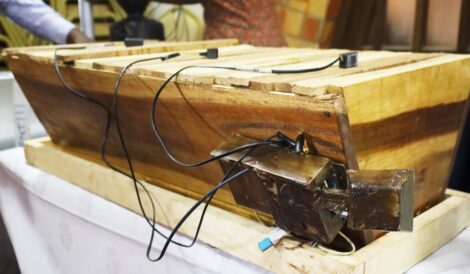Makerere AI Health Lab Champions Artificial Intelligence in Uganda’s Malaria Fight
As Uganda continues to face a significant malaria burden, experts at Makerere University are pioneering innovative approaches that harness the power of Artificial Intelligence (AI) to transform how the disease is diagnosed, tracked, and ultimately controlled.
Speaking during a World Malaria Day webinar co-hosted by the Makerere AI Health Lab and the Malaria Consortium, Dr. Rose Nakasi, Principal investigator of the Lab emphasized that while global and national efforts have led to progress, critical gaps remain in accurate diagnosis, real-time surveillance, and effective community engagement—especially in low-resource settings.
The webinar focused on the potential of AI-powered tools to address these challenges by improving malaria diagnosis, enhancing disease surveillance, and informing policy through data-driven decision-making. Panelists explored the feasibility, impact, and scalability of AI-driven diagnostics and surveillance technologies in resource-constrained environments.
“Despite advances, we still face significant challenges in timely diagnosis and disease tracking,” Dr. Nakasi said. “AI offers us a powerful tool to enhance accuracy, strengthen surveillance, and support evidence-based interventions in malaria control.”
AI for Diagnosis: The Ocular Project
Through its flagship Ocular Project, the Makerere AI Health Lab has developed a 3D-printed adapter that transforms a standard microscope and smartphone into an AI-powered diagnostic tool. This innovation allows health workers to digitally capture images of blood smears and use machine learning models trained to detect malaria parasites with expert-level accuracy.
“This technology allows lab technicians to work more efficiently while maintaining diagnostic integrity,” Dr. Nakasi noted. “It also facilitates large-scale data collection that can inform predictive models and timely health interventions.”
Traditional diagnosis through microscopy remains the gold standard but is time-consuming and depends heavily on skilled human resources. WHO recommends that lab technicians process no more than 40 slides per day, yet many technicians routinely exceed this due to high patient volumes, risking burnout and diagnostic errors. The Ocular system addresses these challenges by automating parasite detection and reducing reliance on overburdened personnel.
Real-Time Surveillance and Ecosystem Intelligence
Beyond diagnostics, the Lab is leveraging AI to address another major challenge in malaria control: delayed surveillance data. In many rural and underserved areas, health records are still captured manually, then aggregated weekly or monthly before being digitized. This lag hinders the government’s ability to respond swiftly to outbreaks.
“What we are proposing under the Ocular Project is a shift to real-time reporting,” Dr. Nakasi explained. “Once a detection is made, the data is automatically captured and integrated into the national Health Management Information Systems (HMIS), eliminating the delays of paper-based reporting.”
Recognizing that malaria is a vector-borne disease influenced by environmental conditions, the AI models also incorporate diverse data—such as mosquito breeding patterns, rainfall, humidity, and insecticide-treated net (ITN) coverage—to enhance predictive capabilities. This approach enables more accurate forecasting and supports timely, geographically targeted interventions.
“We’re working with environmental health experts and those involved in net distribution to bring their data into our models,” Dr. Nakasi said. “Our goal is to provide the Ministry of Health with contextualized, real-time insights that inform strategic decisions and resource deployment.”
Bringing AI to the People: Multilingual Chatbots and Community Engagement
Makerere AI Health Lab is also tackling a critical, often overlooked aspect of technology deployment: public understanding and accessibility.
“We operate in a multilingual society where many people may not be fluent in English or familiar with emerging technologies like AI,” said Dr. Nakasi. “It’s essential that communities understand and trust these tools.”
To bridge this gap, the Lab is developing AI-powered chatbots and medical translation systems in local languages to educate communities on malaria prevention, symptoms, treatment, and the role AI can play in healthcare. These tools are being designed not just as communication platforms but as digital health educators—empowering people with the knowledge needed to prevent and seek treatment for malaria.
“These chatbots are more than software—they are community-facing, culturally aware tools that raise awareness and foster trust in the health system,” Dr. Nakasi said.
A Scalable Vision with Global Impact
The Makerere AI Health Lab’s work is backed by major partners, including Google and the NIH-funded DSI Africa initiative. Their support is enabling a multidisciplinary approach that brings together engineers, public health experts, computer scientists, and frontline health workers.
“This is more than a research project—it’s a national commitment to using innovation to save lives,” said Dr. Nakasi. “As we mark World Malaria Day, we must continue investing in solutions that bridge the gap between innovation and impact, especially in the communities that need them most.”
With Uganda still recording malaria as the cause of up to 34% of outpatient visits and nearly 30% of inpatient admissions, Makerere’s AI-powered solutions represent a promising, scalable path forward in the country’s—and Africa’s—fight against malaria.

